Fitting a real-data covariance matrix: interpretation (2)
Jason Willwerscheid
9/18/2020
Last updated: 2020-09-18
Checks: 6 0
Knit directory: drift-workflow/analysis/
This reproducible R Markdown analysis was created with workflowr (version 1.2.0). The Report tab describes the reproducibility checks that were applied when the results were created. The Past versions tab lists the development history.
Great! Since the R Markdown file has been committed to the Git repository, you know the exact version of the code that produced these results.
Great job! The global environment was empty. Objects defined in the global environment can affect the analysis in your R Markdown file in unknown ways. For reproduciblity it’s best to always run the code in an empty environment.
The command set.seed(20190211) was run prior to running the code in the R Markdown file. Setting a seed ensures that any results that rely on randomness, e.g. subsampling or permutations, are reproducible.
Great job! Recording the operating system, R version, and package versions is critical for reproducibility.
Nice! There were no cached chunks for this analysis, so you can be confident that you successfully produced the results during this run.
Great! You are using Git for version control. Tracking code development and connecting the code version to the results is critical for reproducibility. The version displayed above was the version of the Git repository at the time these results were generated.
Note that you need to be careful to ensure that all relevant files for the analysis have been committed to Git prior to generating the results (you can use wflow_publish or wflow_git_commit). workflowr only checks the R Markdown file, but you know if there are other scripts or data files that it depends on. Below is the status of the Git repository when the results were generated:
Ignored files:
Ignored: .DS_Store
Ignored: .Rhistory
Ignored: .Rproj.user/
Ignored: data/.DS_Store
Ignored: data/datasets/
Ignored: docs/.DS_Store
Ignored: docs/assets/.DS_Store
Ignored: output/
Untracked files:
Untracked: analysis/extrapolate3.Rmd
Untracked: analysis/extrapolate4.Rmd
Untracked: analysis/pm1_priors_tmp.Rmd
Unstaged changes:
Modified: analysis/index.Rmd
Modified: analysis/tree_literature.Rmd
Modified: drift-workflow.Rproj
Note that any generated files, e.g. HTML, png, CSS, etc., are not included in this status report because it is ok for generated content to have uncommitted changes.
These are the previous versions of the R Markdown and HTML files. If you’ve configured a remote Git repository (see ?wflow_git_remote), click on the hyperlinks in the table below to view them.
| File | Version | Author | Date | Message |
|---|---|---|---|---|
| Rmd | 01ac5e4 | Jason Willwerscheid | 2020-09-18 | wflow_publish(“analysis/covmat_1kg_shared4.Rmd”) |
suppressMessages({
library(flashier)
library(drift.alpha)
library(tidyverse)
})Here I’ve altered the fitting process from the previous analysis. The purpose was to try to speed things up but the whole thing still takes about half an hour. In any case, it’s useful to see how the fits vary. The importance of the out-of-Africa and European factors is much different here, and some of the weirdness in the previous results has disappeared, but other weirdness has cropped up elsewhere.
Superpopulations
covmat <- readRDS("../data/datasets/1kg_phase3_derived/1kg_phase3_derived_covmat.rds")
meta <- readRDS("../data/datasets/1kg_phase3_derived/1kg_phase3_derived_meta.rds")
plot_fl <- function(LL) {
df <- data.frame(LL)
colnames(df) <- paste0("Factor ", formatC(1:ncol(LL), width = 2, flag = "0"))
df$subpop <- meta$pop
df$superpop <- meta$super_pop
df <- df %>% arrange(superpop, subpop)
df$idx <- 1:nrow(df)
gath_df <- df %>%
gather(K, value, -subpop, -idx, -superpop) %>%
mutate(K = factor(K))
med_gath_df <- gath_df %>%
group_by(subpop, K) %>%
summarise(value=median(value), idx=median(idx))
p <- ggplot(gath_df, aes(x=idx, y=value, color=superpop)) +
geom_point() +
facet_wrap(~K) +
geom_hline(yintercept = 0, linetype = "dashed") +
theme(axis.title.x=element_blank(),
axis.text.x=element_blank(),
axis.ticks.x=element_blank()) +
labs(color="superpop")
return(p)
}
plot_subpops <- function(LL) {
df <- data.frame(LL)
colnames(df) <- paste0("Factor ", formatC(1:ncol(LL), width = 2, flag = "0"))
df$subpop <- meta$pop
df$superpop <- meta$super_pop
df <- df %>% arrange(superpop, subpop)
df$idx <- 1:nrow(df)
gath_df <- df %>%
gather(K, value, -subpop, -idx, -superpop) %>%
mutate(K = factor(K))
med_gath_df <- gath_df %>%
group_by(subpop, K) %>%
summarise(value=median(value), idx=median(idx))
all_plots <- lapply(levels(df$superpop), function(pop) {
p <- ggplot(filter(gath_df, superpop == pop), aes(x=idx, y=value, color=subpop)) +
geom_point() +
facet_wrap(~K) +
geom_hline(yintercept = 0, linetype = "dashed") +
theme(axis.title.x=element_blank(),
axis.text.x=element_blank(),
axis.ticks.x=element_blank()) +
labs(color="subpop") +
ggtitle(paste("superpop:", pop))
return(p)
})
}t_greedy <- system.time({
ones <- matrix(1, nrow = nrow(covmat), ncol = 1)
ls.soln <- t(solve(crossprod(ones), crossprod(ones, covmat)))
covmat_diagNA <- covmat
diag(covmat_diagNA) <- NA
fl_g <- flash.init(covmat_diagNA) %>%
flash.set.verbose(0) %>%
flash.init.factors(EF = list(ones, ls.soln)) %>%
flash.fix.loadings(kset = 1, mode = 1) %>%
flash.backfit() %>%
flash.add.greedy(Kmax = 14,
prior.family = prior.point.laplace())
})
cat("Time to fit greedy factors:", round(t_greedy[3], 1), "seconds")#> Time to fit greedy factors: 79.2 secondst_backfit <- system.time({
fl_bf <- fl_g %>% flash.backfit(tol = 1)
})
cat("Time to backfit:", round(t_backfit[3] / 60, 1), "minutes")#> Time to backfit: 5.1 minutesLL <- fl_bf$loadings.pm[[1]] %*% diag(sqrt(fl_bf$loadings.scale))
t_drift1 <- system.time({
dr <- init_from_covmat(covmat, LL, p = 30000, fix.EL = 1,
prior.family = prior.point.laplace())
dr <- drift(dr, maxiter = 500, tol = 1e-2, verbose = FALSE)
})#> Warning in mle_point_laplace(x_optset, s_optset, g, control): First
#> optimization attempt failed. Retrying with fewer significant digits.#> Error in (function (f, p, ..., hessian = FALSE, typsize = rep(1, length(p)), :
#> probable coding error in analytic Hessian
cat("Time to drift (point-Laplace):", round(t_drift1[3] / 60, 1), "minutes")#> Time to drift (point-Laplace): 0.9 minutesLL <- dr$EL %*% diag(sqrt(dr$prior_s2))
LL <- LL[, c(1, rep(2:fl_bf$n.factors, each = 2))]
LL <- t(t(LL) * c(1, rep(c(1, -1), fl_bf$n.factors - 1)))
LL <- pmax(LL, 0)
LL_scale <- apply(LL, 2, max)
LL <- t(t(LL) / LL_scale)
zero_cols <- which(LL_scale < 1e-2)
LL <- LL[, -zero_cols]
LL_scale <- LL_scale[-zero_cols]
t_drift2 <- system.time({
dr_bm <- init_from_covmat(covmat, LL, p = 30000, prior.s2 = LL_scale^2, fix.EL = 1,
prior.family = prior.bimodal())
dr_bm <- drift(dr_bm, maxiter = 500, tol = 1e-4, verbose = FALSE)
})
cat("Time to drift (bimodal):", round(t_drift2[3] / 60, 1), "minutes")#> Time to drift (bimodal): 27.6 minutes
LL <- dr_bm$EL %*% diag(sqrt(dr_bm$prior_s2))
LL_norms <- apply(LL, 2, function(x) sum(x^2))
LL <- LL[, order(LL_norms, decreasing = TRUE)]
LL_norms <- apply(LL, 2, function(x) sum(x^2))
zero_cols <- which(LL_norms < 1e-6)
LL <- LL[, -zero_cols]
plot(plot_fl(LL))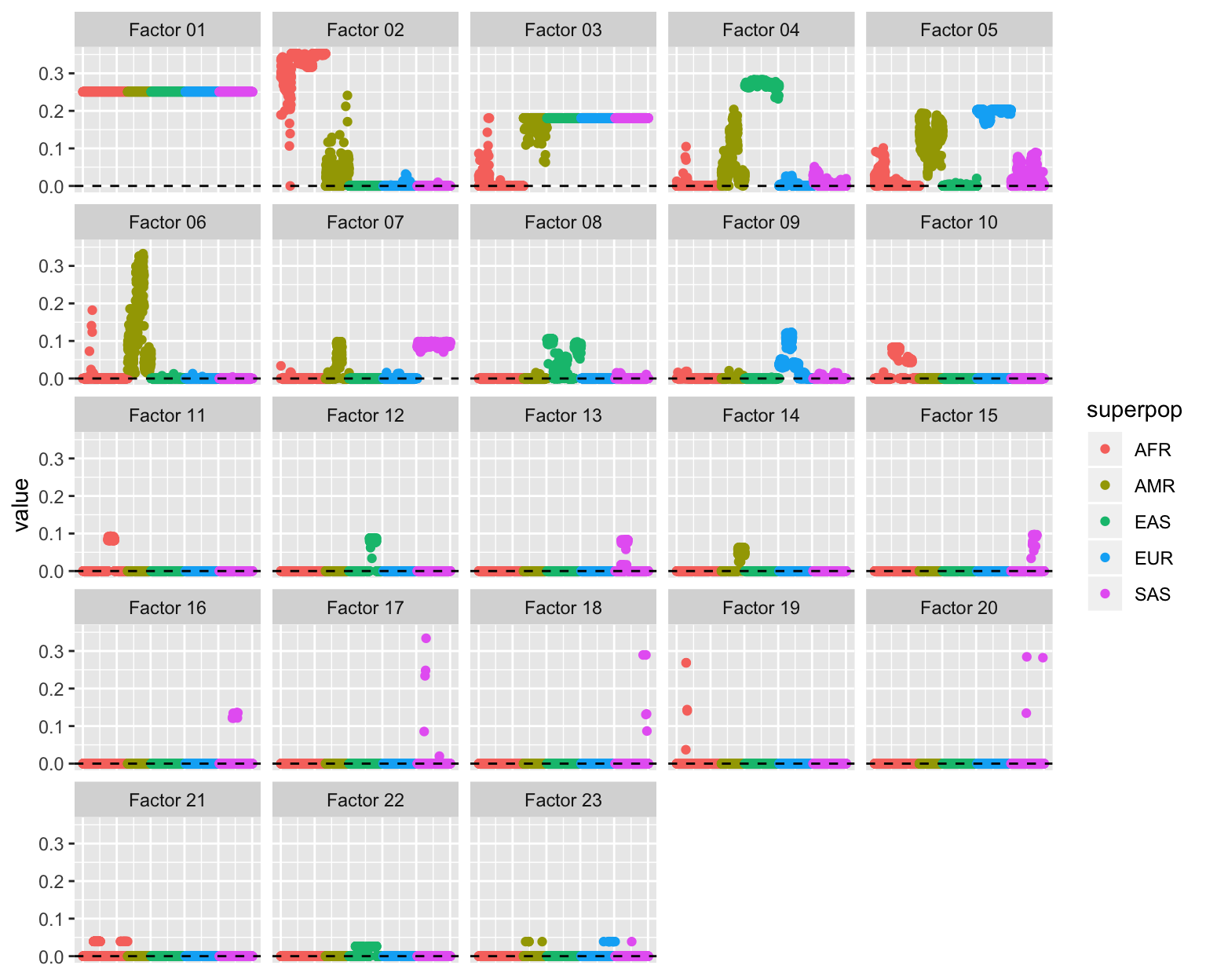
Subpopulations
all_p <- plot_subpops(LL)
for (p in all_p) {plot(p)}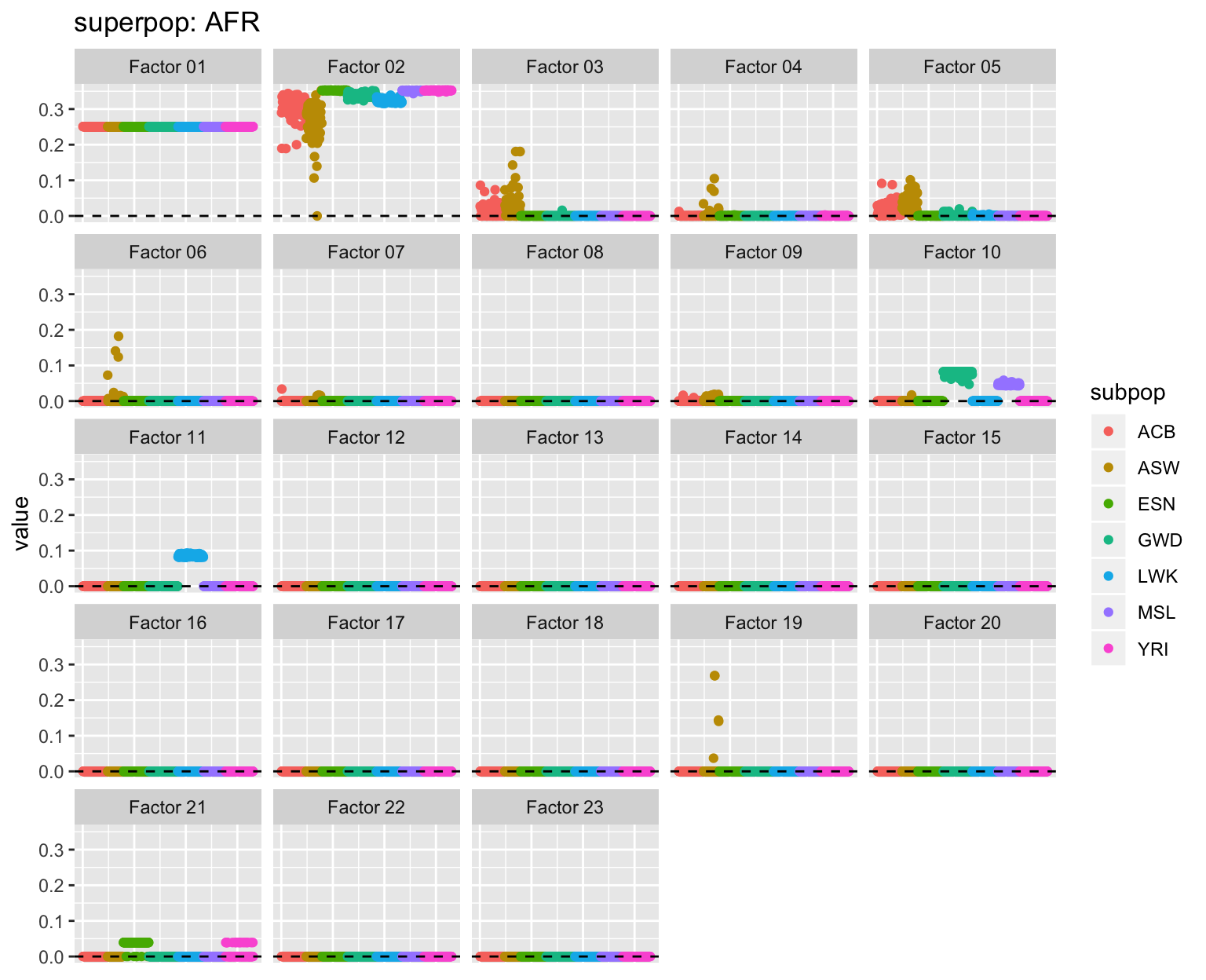
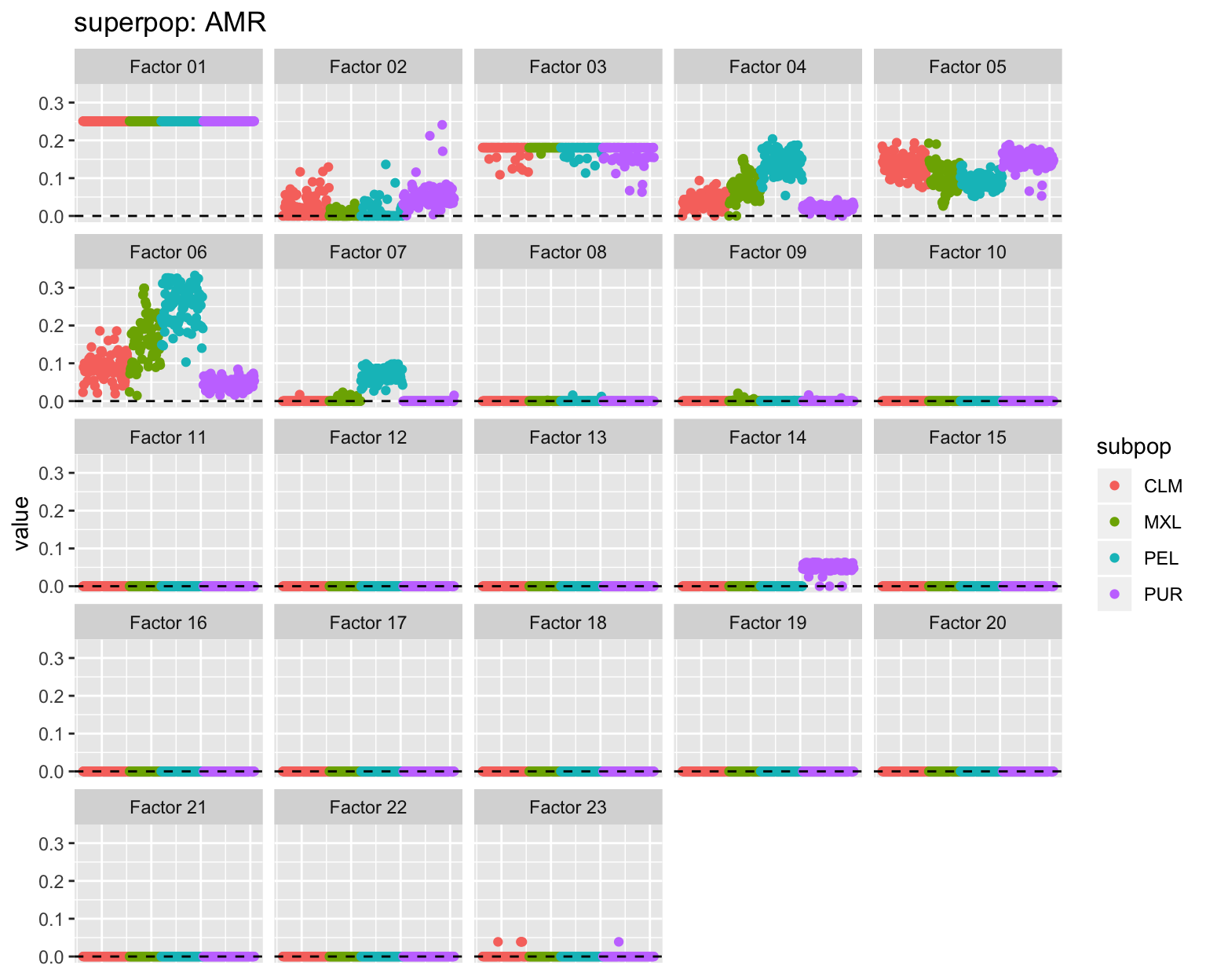
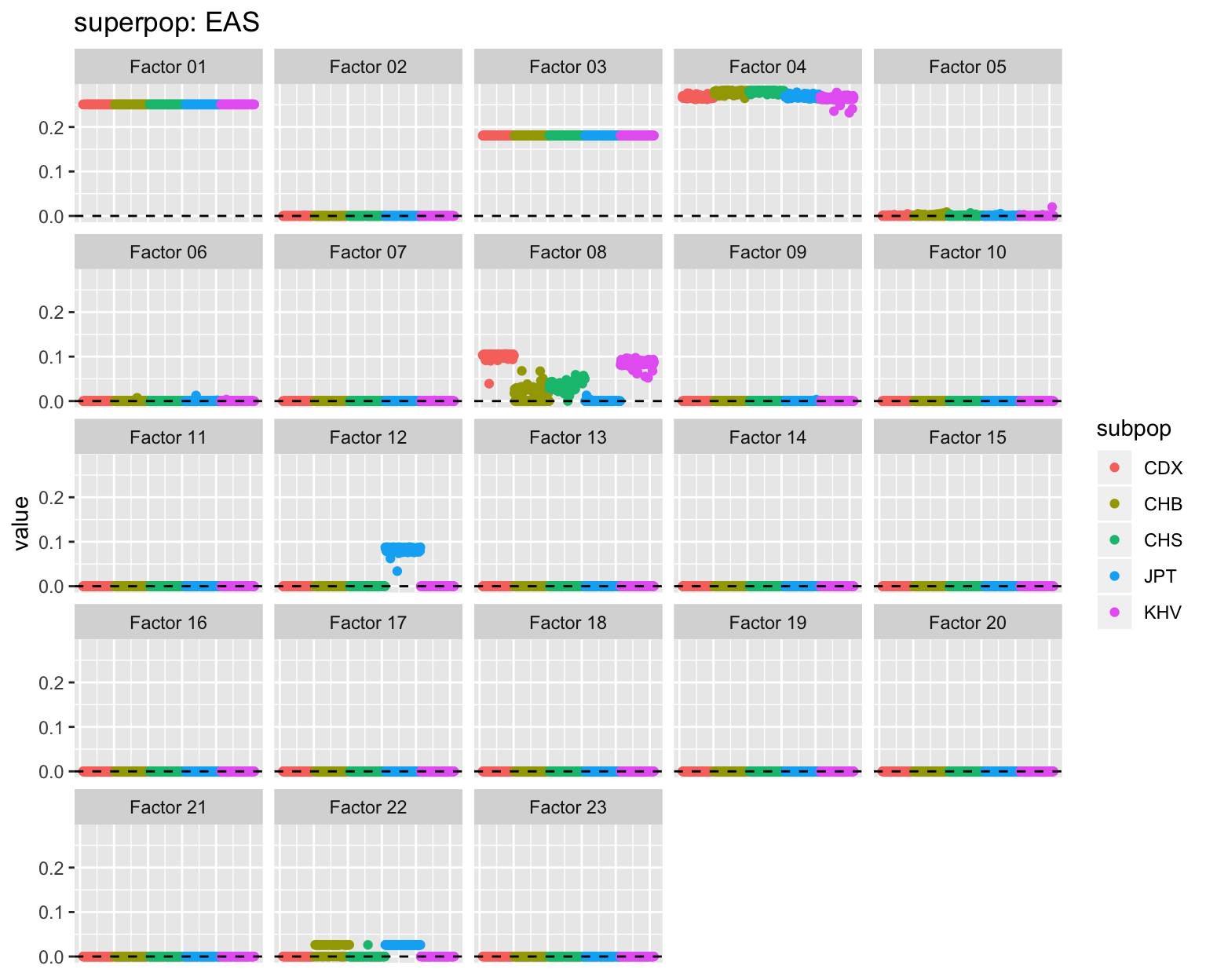
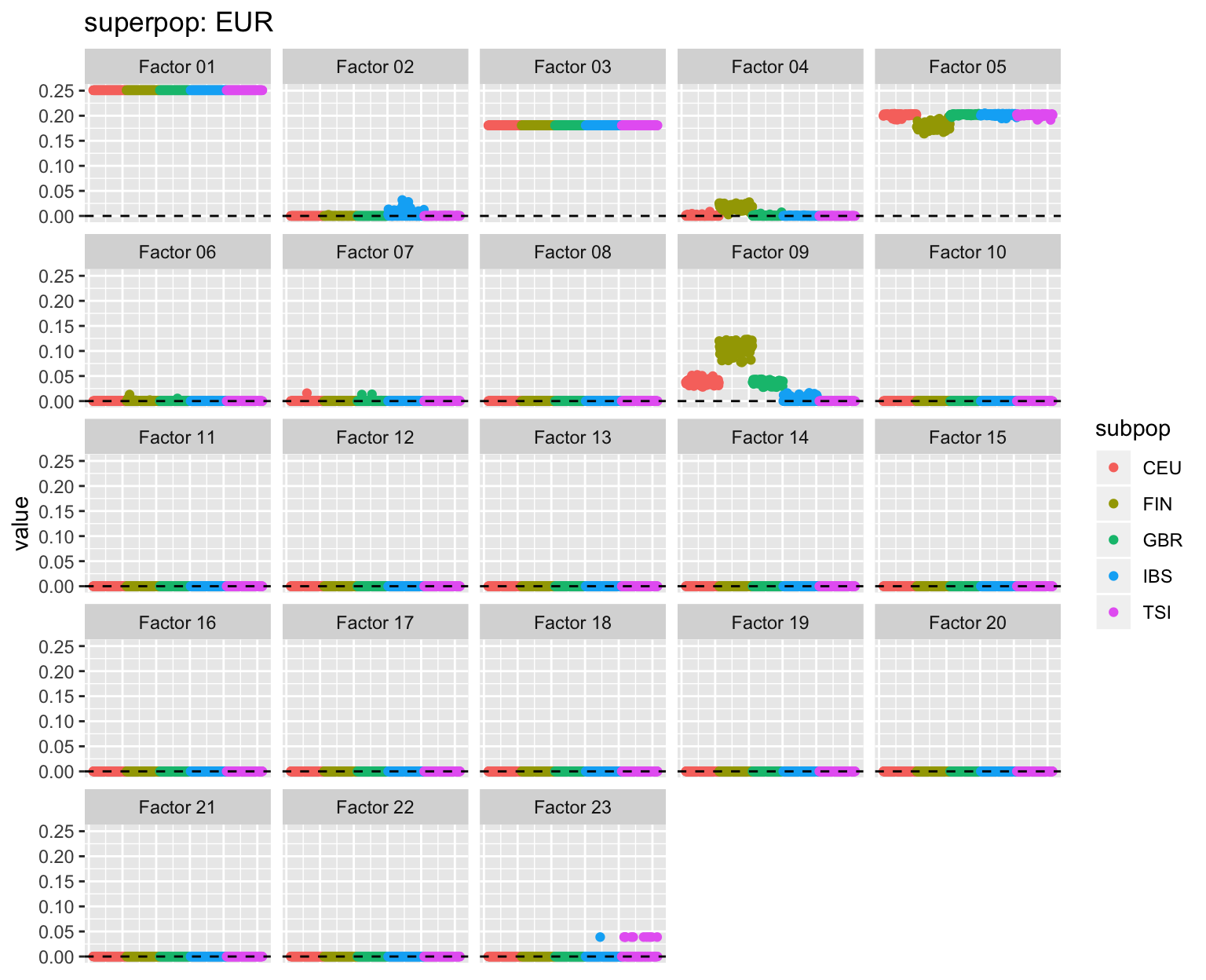
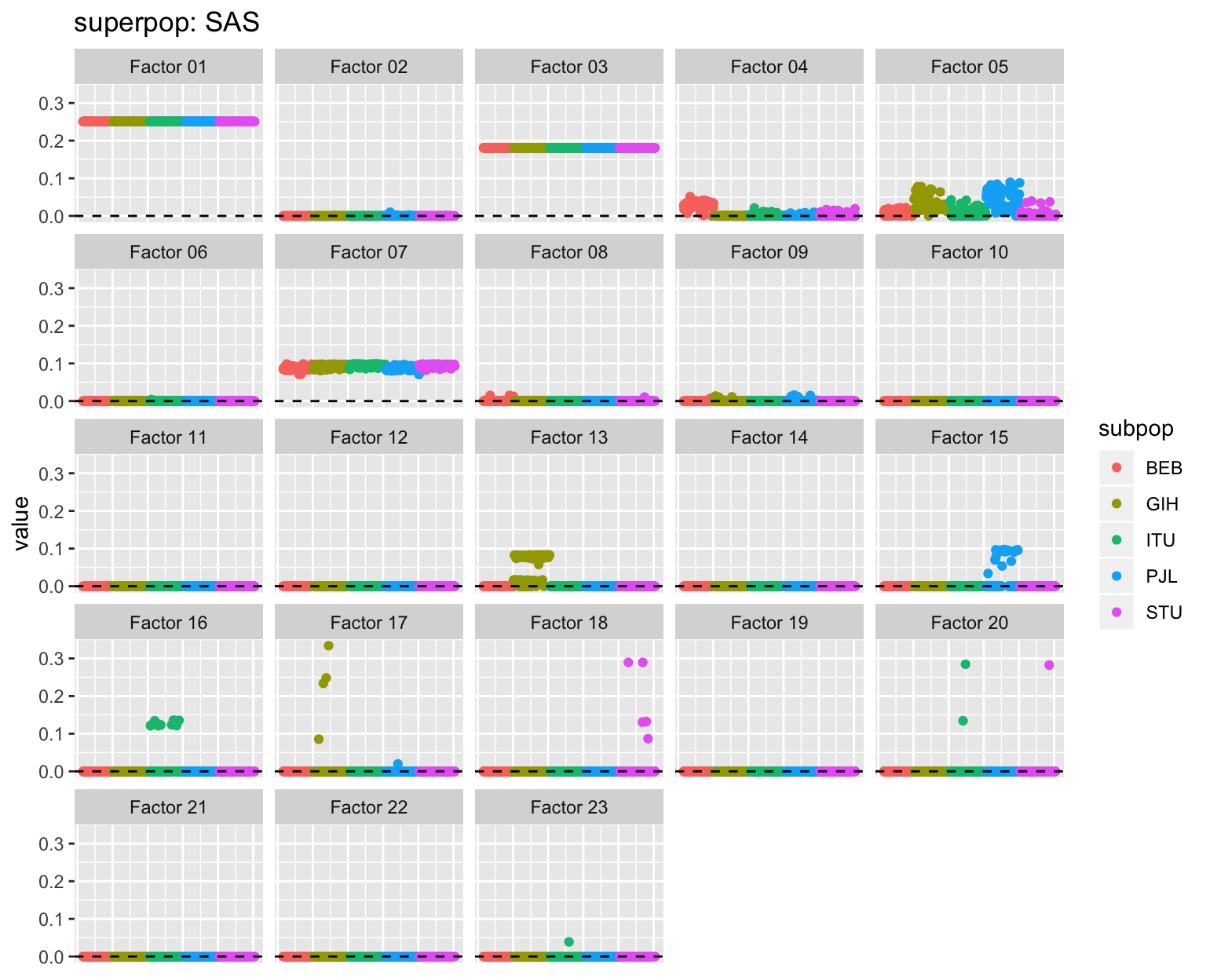
Factor descriptions
Factor 2: The primary African factor, with varying degrees of admixture for African Americans (ASW), African Caribbeans (ACB), and Amerindians. Intriguingly, there is a small degree of admixture for many Iberians (IBR).
Factor 3: The out-of-Africa factor. Again, there are varying degrees of admixture for African Americans, African Caribbeans, and Amerindians.
Factor 4: The primary East Asian factor. Among Amerindians, loadings are largest among Peruvians and smallest among Puerto Ricans (PUR). Interestingly, there is a small degree of admixture for Finns (FIN) and most South Asians (most notably among Bengalis (BEB)).
Factor 5: The primary European factor, with strong contributions from South Asian populations (especially Punjabi and Gujarati) and varying degrees of admixture for African Americans, African Caribbeans, and Amerindians. There is a single Vietnamese (KHV) individual with a nonzero loading: this can probably be ignored.
Factor 6: The Amerindian factor, with loadings largest among Peruvians and smallest among Puerto Ricans (PUR). A few African Americans are also loaded on this factor.
Factor 7: The primary South Asian factor. Oddly, Peruvians (and a single African Caribbean individual) are also loaded on this factor.
Factor 8: Substructure among East Asians: large loadings for the more Southeastern Vietnamese and Chinese Dai populations, modest loadings for some Chinese Han, and mostly zero loadings for Japanese.
Factor 9: Substructure among Europeans: largest loadings among the Finns with more modest loadings for other Northern European populations (GBR and CEU).
Factor 10: A West African factor: large loadings for Gambians (GWD) and modest loadings for the Mende from Sierra Leone (MSL).
Factor 11: Kenyan.
Factor 12: Japanese.
Factor 13: Common to some, but not all Gujarati Indians from Houston.
Factor 14: Puerto Rican. I was surprised to see a separate factor for this population.
Factor 15: Common to some, but not all Punjabi.
Factor 16: Common to some, but not all Telugu Indians.
Factor 17: Unique to several Gujarati Indians from Houston.
Factor 18: Unique to several Sri Lankans.
Factor 19: Unique to several African Americans.
Factor 20: Unique to three South Asian individuals (two Telugu and one Sri Lankan).
Factor 21: Shared among the two Nigerian populations (Esan (ESN) and Yoruba (YRI)).
Factor 22: Shared among Japanese and most Chinese Han from Beijing.
- Factor 23: Shared among several Toscani and a few Puerto Ricans and Colombians.
sessionInfo()#> R version 3.5.3 (2019-03-11)
#> Platform: x86_64-apple-darwin15.6.0 (64-bit)
#> Running under: macOS Mojave 10.14.6
#>
#> Matrix products: default
#> BLAS: /Library/Frameworks/R.framework/Versions/3.5/Resources/lib/libRblas.0.dylib
#> LAPACK: /Library/Frameworks/R.framework/Versions/3.5/Resources/lib/libRlapack.dylib
#>
#> locale:
#> [1] en_US.UTF-8/en_US.UTF-8/en_US.UTF-8/C/en_US.UTF-8/en_US.UTF-8
#>
#> attached base packages:
#> [1] stats graphics grDevices utils datasets methods base
#>
#> other attached packages:
#> [1] forcats_0.4.0 stringr_1.4.0 dplyr_0.8.0.1
#> [4] purrr_0.3.2 readr_1.3.1 tidyr_0.8.3
#> [7] tibble_2.1.1 ggplot2_3.2.0 tidyverse_1.2.1
#> [10] drift.alpha_0.0.11 flashier_0.2.7
#>
#> loaded via a namespace (and not attached):
#> [1] Rcpp_1.0.4.6 lubridate_1.7.4 invgamma_1.1
#> [4] lattice_0.20-38 assertthat_0.2.1 rprojroot_1.3-2
#> [7] digest_0.6.18 truncnorm_1.0-8 R6_2.4.0
#> [10] cellranger_1.1.0 plyr_1.8.4 backports_1.1.3
#> [13] evaluate_0.13 httr_1.4.0 pillar_1.3.1
#> [16] rlang_0.4.2 lazyeval_0.2.2 readxl_1.3.1
#> [19] rstudioapi_0.10 ebnm_0.1-21 irlba_2.3.3
#> [22] whisker_0.3-2 Matrix_1.2-15 rmarkdown_1.12
#> [25] labeling_0.3 munsell_0.5.0 mixsqp_0.3-40
#> [28] broom_0.5.1 compiler_3.5.3 modelr_0.1.5
#> [31] xfun_0.6 pkgconfig_2.0.2 SQUAREM_2017.10-1
#> [34] htmltools_0.3.6 tidyselect_0.2.5 workflowr_1.2.0
#> [37] withr_2.1.2 crayon_1.3.4 grid_3.5.3
#> [40] nlme_3.1-137 jsonlite_1.6 gtable_0.3.0
#> [43] git2r_0.25.2 magrittr_1.5 scales_1.0.0
#> [46] cli_1.1.0 stringi_1.4.3 reshape2_1.4.3
#> [49] fs_1.2.7 xml2_1.2.0 generics_0.0.2
#> [52] tools_3.5.3 glue_1.3.1 hms_0.4.2
#> [55] parallel_3.5.3 yaml_2.2.0 colorspace_1.4-1
#> [58] ashr_2.2-51 rvest_0.3.4 knitr_1.22
#> [61] haven_2.1.1